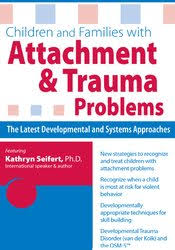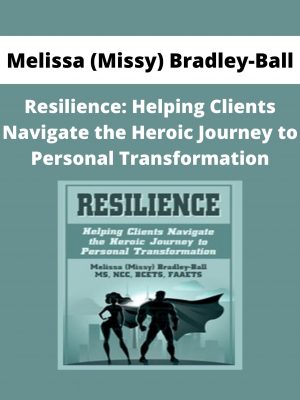Kathryn Seifert – Children and Families with Attachment & Trauma Problems
$200 Original price was: $200.$75Current price is: $75.
Shopping Instructions:
- DISCOUNT 15% : SHOP15
- Product Delivery: Within 1 – 12 hours after purchase.
By completing this seminar recording you will uncover many factors that can alter the normal development of children and learn the warning signs of attachment problems.
Kathryn Seifert – Children and Families with Attachment & Trauma Problems
Join Dr. Kathy Seifert, one of the nation’s leading experts in the field of attachment and trauma disorders in children, and learn proven techniques you can use to help children look at their trauma with new eyes, reducing the emotional impact of the trauma in the present day. You’ll learn how to identify the outward signs of trauma and how you can use the experience of trauma to help children develop skills and feel stronger.
By completing this seminar recording you will uncover many factors that can alter the normal development of children and learn the warning signs of attachment problems. Walk away with multiple treatment options you can provide to children and their families to counteract trauma and anger in their lives.
Dr. Kathy Seifert is a leading psychotherapist, author, speaker and researcher who specializes in family violence and trauma. She will provide you with the latest prevention, assessment and treatment strategies for attachment and trauma in children and families.
- Describe three negative effects of trauma on children’s development
- Identify the best method to recognize children with attachment problems
- List three trauma reduction techniques
- Name five risk factors that place children at higher risk for violence
- Describe how to match the needs of the child and the family with the treatment techniques
- Describe how healthy families support healthy development of children
Would you like to receive Kathryn Seifert – Children and Families with Attachment & Trauma Problems ?
Overview
- Child Development & Attachment
- Core concepts of child development and how they are affected by trauma
- Vital functions of secure attachment
- Major symptoms of disrupted attachment
Assessment
- Children
- 6 symptom categories
- Traumatized brain
- 3 attachment patterns
- Holistic assessment practices
- Assessing development
- Parents
- Awareness of emotional and environmental triggers
- Marital relationships and co-parenting
- Parenting attitudes and competencies
- Parent mental health and stability
- Family System
- Structure—family systems work
- Ongoing patterns
- Support systems
- Stressors and stress management
Treatment
- Focus of Intervention
- Child
- Family relationships
- Community systems
- Rules, roles and boundaries
- Integration of Interventions
- Family therapy
- CBT and skill building involving parents and schools
- Longevity and relationships
- Story-telling and psycho-drama—healing trauma by changing the end of the story
- Movement and rhythm
- Building confidence and competence
- Applications
- Foster care
- Departments of Social Services and Juvenile Services
- Acute care and residential treatment programs
- Outpatient settings with multiple agency involvement
- Facilitate the Healing Process
- The trauma cycle—fight, flight and freeze
- Unfreezing
- Relaxing and reducing fear and arousal responses
- Corrective developmental experience
- Creating attachment
- Using structure attunement and empathy
- Therapeutic Methods
- 4 attachment cycles that can occur in the first year of life
- Rapport
- Commitment
- Building relationship
- Inner child metaphor
- Family systems therapy
- Building reciprocity
- Moral development
- Multimodal approaches and longevity
- Parenting
- 4 aspects of providing a secure base
- Reinterpreting child’s behavior
- Facilitating 4 competencies—knowledge, skills, judgment and self-control
- 3 steps to remaining calm and composed
- Creating a sense of belonging
- Reducing and managing family conflicts
- Creating a healing environment
Related products
HEALTH & MEDICAL
HEALTH & MEDICAL
Dr Heidi M Crocker – Yoga Alignment | Speaker: Heidi Crocker EdD, DC
HEALTH & MEDICAL
HEALTH & MEDICAL
Dr. J.E. Williams & Kevin Gianni – How to Read Your Blood Tests
HEALTH & MEDICAL
Bernadette Giorgi – Attitude Ballet & Pilates Fusion – Just B Method
HEALTH & MEDICAL
HEALTH & MEDICAL












